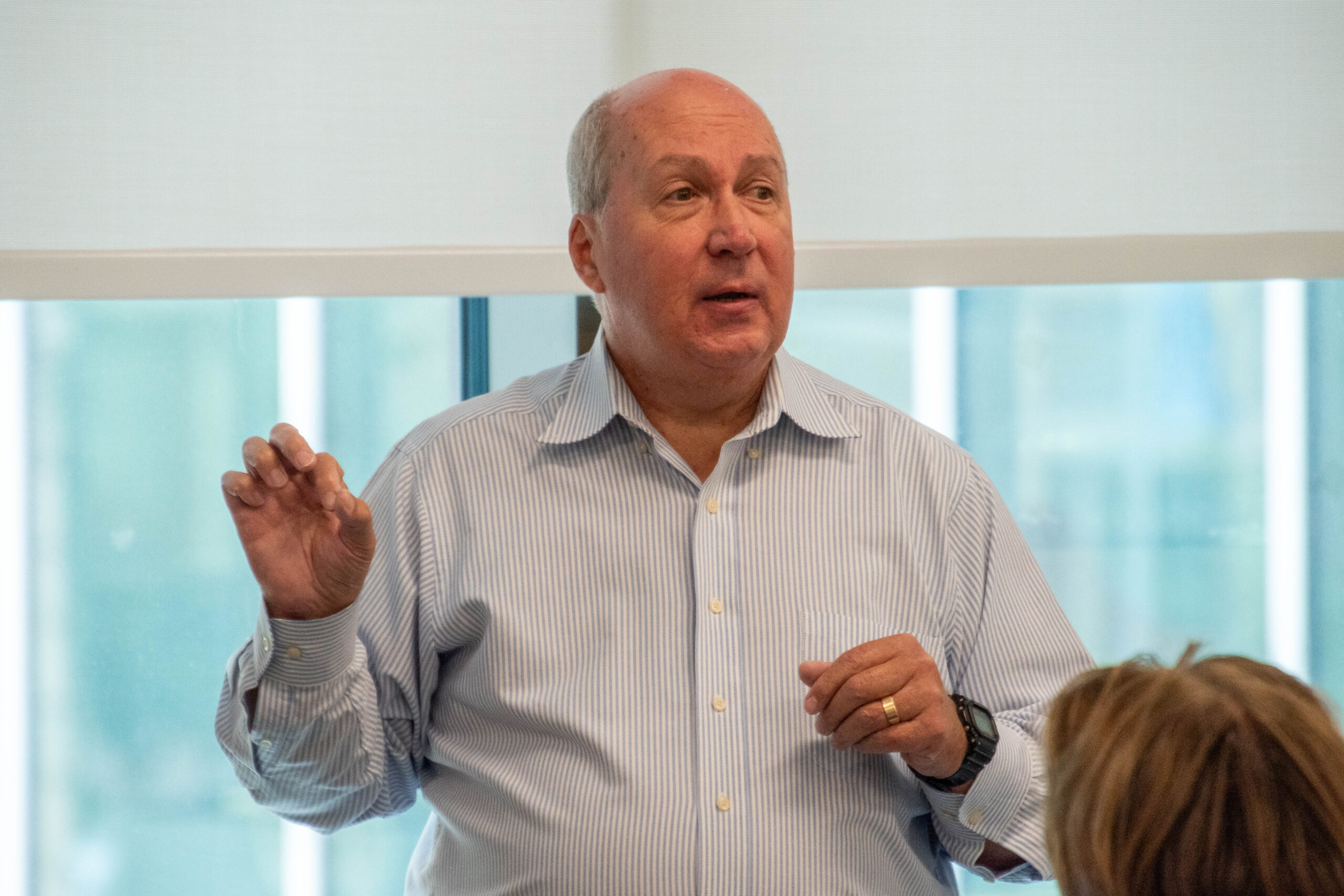Bussiness
Oil price falls 4% after Israel’s attack on Iran; UK business confidence hits four-month low ahead of budget – business live

Introduction: Oil price falls 4% on hopes Middle East can avoid further escalation
Good morning, and welcome to our rolling coverage of business, the financial markets and the world economy.
The oil price is sliding today, on relief that Israel’s attack on Iran last weekend avoided striking energy facilities.
Brent crude has sunk by over 4% this morning, dropping as low as $72 per barrel at one point, its weakest since 1st October – the day that Iran launched its large missile attack on Israel.
Oil is selling off, despite initial fears that Israel’s direct, retaliatory, airstrikes against military targets in Iran on Saturday morning could bring the Middle East closer to a full-scale regional war. The Israeli air force struck about 20 military bases across Iran, including missile and drone manufacturing sites and air defence systems.
Traders, it seems, are relieved that Israel avoided hitting Iranian oil production facilities, which would have removed some supplies from the market.
There are also hopes that Israel’s latest strikes on Iran will mark the end of a months-long cycle of escalation, with US President Joe Biden telling reporters “I hope this is the end.”
🇮🇱 🇮🇷 OIL PRICES PLUMMET AFTER ISRAEL’S “LIMITED” ATTACK ON IRAN
Oil prices dropped over 4% as Israel’s weekend strikes on Iran were viewed as non-disruptive to oil supplies. Brent crude fell to $72.75, while WTI slid to $68.52.
Israel’s attack targeted military installations… pic.twitter.com/MOVnxp1fek
— Mario Nawfal (@MarioNawfal) October 28, 2024
Iran’s president, Masoud Pezeshkian, said yesterday that Tehran was not looking for a war but would respond “appropriately” to Israel’s strikes.
Pezeshkian told a cabinet meeting on Sunday:
“We do not seek war but we will defend the rights of our nation and country,”
The fact Iran hasn’t vowed to respond is “a clear sign of de-escalation – or at least not a re-escalation – of the tensions in the region”, says Ipek Ozkardeskaya, senior analyst at Swissquote Bank, adding:
As such, the geopolitical tensions that were keeping the oil bulls on alert near the $70 per barrel level has gone up in smoke.
The agenda
Key events
French bonds are also weakening a little today, after credit rating agency Moody’s lowered its rating on Paris’s debt on Friday night.
Moody’s revised France’s outlook down to “negative” from “stable” on Friday, citing mounting uncertainty that the country will be able to rein in its widening budget deficits.
Moody’s kept its rating on French debt at Aa2.
Ironically, French bond prices are actually dropping by less than UK, US and German counterparts today.
That has nudged the yield on 10-year French bonds up just 2.5 basis points, to 3.055%.
Government bond yields rising on fears of economic protectionism
Government bond prices are weakening this morning, pushing up the yield – or rate of return – on the debt.
This has pushed the yield on UK 10-year bonds up to 4.27%, the highest since the start of July, a rise of about 6 basis points from 4.21% on Friday night.
Yields rise when bond prices fall, so this can be a sign that investors are nervous about a country’s debt and demanding a higher rate of return.
Chancellor Rachel Reeves will be watching the bond market closely, as she prepares to announce an overhaul of the UK’s budget rules which will give her the flexibility to borrow billions of pounds more.
But the UK is not alone this morning. US 10-year bond yields have also risen today, by around 5 basis points to 4.28%, while German bonds are 4bps higher at 2.32%.
There is concern this morning that the global economic recovery could be derailed by a lurch towards economic protectionism.
The FT reports:
Speaking on the sidelines of the IMF’s annual meetings with the World Bank in Washington this week, officials expressed relief at signs that the global economy is on track for a soft landing, avoiding recession after the worst bout of inflation for a generation.
However, they cautioned that mounting political risks in the US and elsewhere threatened the outlook.
Shares in oil companies are dropping this morning, while airlines are benefitting from the prospect of cheaper fuel.
BP is leading the fallers in London, down 2.2%, followed by Shell (-2%).
But easyJet is the top riser on the FTSE 100, up 3.5%, followed by British Airway’s parent company IAG (+1.9%).
On Friday, the financial sector was rocked by a landmark car finance mis-selling case that could frce companies to pay billions of pounds in compensation to customers who borrowed the money for their new vehicle.
This morning, Lloyds Banking Group – a major provider of motor finance – says it “notes” the Court of Appeal decisions, and is “assessing” its potential impact.
The Court of Appeal ruled in favour of three consumers who argued it was unlawful for lenders to have paid a commission to car dealers without the borrowers’ knowledge.
Shares in Lloyds fell over 7% on Friday after the ruling. This morning, they’re down another 1% in early trading.
Billionaires’ carbon pollution toll exposed
Jillian Ambrose
A study by Oxfam into the emissions of the world’s super-rich has found that the use of private jets and superyachts combined with high-polluting investments are accelerating climate breakdown and wreaking havoc on lives and economies around the world.
The research found that the world’s 50 richest billionaires took on average 184 private jet flights in a single year, spending 425 hours in the air and producing as much carbon as the average person would in 300 years. Their luxury yachts emitted as much carbon as the average person would in 860 years, according to the report.
Chiara Liguori, Oxfam’s senior climate justice policy advisor, said:
“Most of the super-rich are treating our planet like their personal playground, setting it ablaze for pleasure and profit.”
Ahead of the Labour government’s first budget statement Oxfam is calling on the chancellor, Rachel Reeves, to increase taxes on “climate-polluting extreme wealth”, starting with private jets and superyachts, to raise funds which could be used to tackle the climate crisis.
The report found that if all people used private jets and superyachts as much as the group of ultra-wealthy individuals highlighted in the report, the world would breach its climate targets in two days rather than current estimates of four years if carbon emissions remain as they are today.
However, it is their investments in fossil fuels which creates even greater damage, according to the report. It found that the investments made by this group created around 340 times more emissions than from their private jets and superyachts combined.
Liguori says:
“The evidence is clear: the extreme emissions of the richest, from their luxury lifestyles and even more from their polluting investments, are fueling inequality, hunger and threatening lives. It’s not just unfair that their reckless pollution is fueling the very crisis threatening our collective future —it’s lethal.”
“This report shows that fairer taxes on extreme wealth are crucial to accelerate climate action and fight inequality – starting with private jets and superyachts. It’s clear these luxury toys aren’t just symbols of excess; they’re a direct threat to people and the planet.”
The study into both the luxury transport and polluting investments of billionaires, believed to be the first of its kind, found that the ultra-wealthy billionaires are responsible for causing economic losses of trillions of dollars as well as contributing to huge crop losses and millions of excess deaths because the impacts of the climate crisis are disproportionately felt by low-income countries and communities.
The carbon emissions of the world’s richest 1% have caused global economic output to drop by $2.9 trillion since 1990, according to Oxfam. It found that low- and lower-middle-income countries are expected to lose about 2.5% of their cumulative GDP between 1990 and 2050 due to the impact of the climate crisis while high-income countries are likely to accrue economic gains, it said.
UK business confidence dips to lowest level since June
UK business confidence has dipped to a four-month low in October, a new survey has shown.
Firms are less optimistic about their own trading prospects, and wider economic optimism, according to the latest Lloyds Business Barometer.
The net balance of optimism towards the economy slipped three points to 35%, the lowest since March, Lloyds reports. In October, 55% of businesses felt more confident about the economy than three months ago (down from 57%), while 20% were less positive (up from 19%).
Hann-Ju Ho, senior economist at Lloyds Commercial Banking, said:
“Although overall business confidence dipped in October, it follows a sustained period of significant optimism, and business sentiment remains above historical levels. Encouragingly, many businesses remain confident in their own trading prospects, and the increase in hiring intentions suggests more employers want to grow their workforce.
“Businesses’ broader economic outlook continues to reflect this rounded picture, and as they move into the final part of the year, they will look to manage these considerations effectively.”
This is the latest in a string of surveys showing a drop in consumer and business morale in recent weeks, as the government has signalled that this week’s budget will be a tough affair.
Prime minister Sir Keir Starmer is expected to talk about “the harsh light of fiscal reality” in a speech today, and the need to run towards “tough decisions”…
Introduction: Oil price falls 4% on hopes Middle East can avoid further escalation
Good morning, and welcome to our rolling coverage of business, the financial markets and the world economy.
The oil price is sliding today, on relief that Israel’s attack on Iran last weekend avoided striking energy facilities.
Brent crude has sunk by over 4% this morning, dropping as low as $72 per barrel at one point, its weakest since 1st October – the day that Iran launched its large missile attack on Israel.
Oil is selling off, despite initial fears that Israel’s direct, retaliatory, airstrikes against military targets in Iran on Saturday morning could bring the Middle East closer to a full-scale regional war. The Israeli air force struck about 20 military bases across Iran, including missile and drone manufacturing sites and air defence systems.
Traders, it seems, are relieved that Israel avoided hitting Iranian oil production facilities, which would have removed some supplies from the market.
There are also hopes that Israel’s latest strikes on Iran will mark the end of a months-long cycle of escalation, with US President Joe Biden telling reporters “I hope this is the end.”
🇮🇱 🇮🇷 OIL PRICES PLUMMET AFTER ISRAEL’S “LIMITED” ATTACK ON IRAN
Oil prices dropped over 4% as Israel’s weekend strikes on Iran were viewed as non-disruptive to oil supplies. Brent crude fell to $72.75, while WTI slid to $68.52.
Israel’s attack targeted military installations… pic.twitter.com/MOVnxp1fek
— Mario Nawfal (@MarioNawfal) October 28, 2024
Iran’s president, Masoud Pezeshkian, said yesterday that Tehran was not looking for a war but would respond “appropriately” to Israel’s strikes.
Pezeshkian told a cabinet meeting on Sunday:
“We do not seek war but we will defend the rights of our nation and country,”
The fact Iran hasn’t vowed to respond is “a clear sign of de-escalation – or at least not a re-escalation – of the tensions in the region”, says Ipek Ozkardeskaya, senior analyst at Swissquote Bank, adding:
As such, the geopolitical tensions that were keeping the oil bulls on alert near the $70 per barrel level has gone up in smoke.









